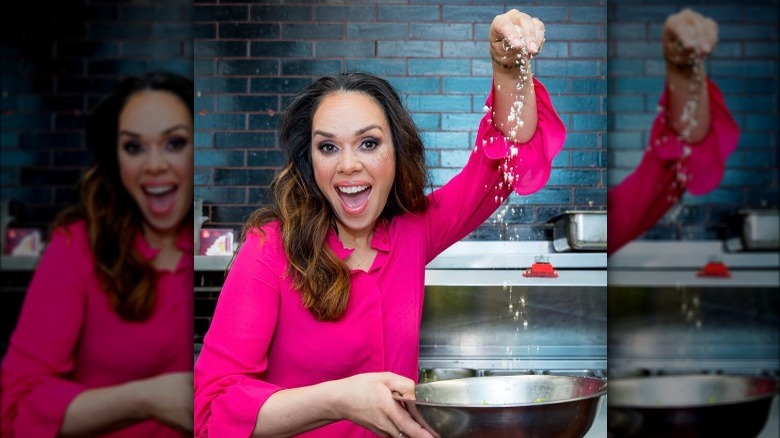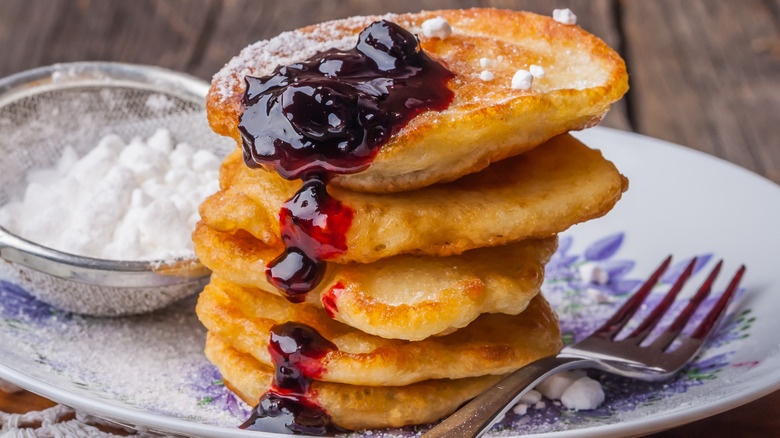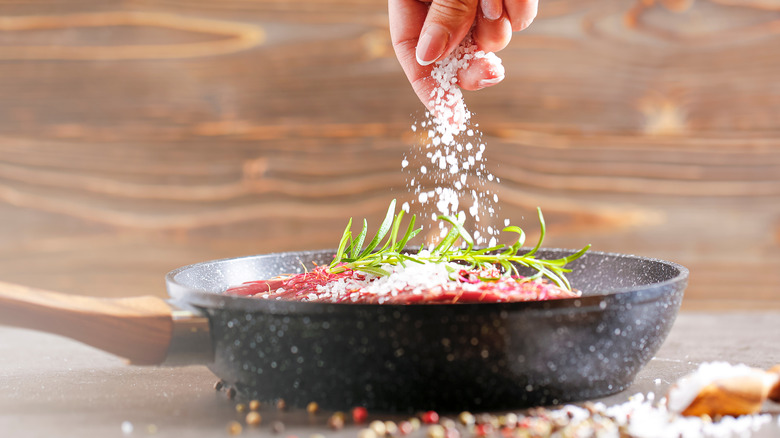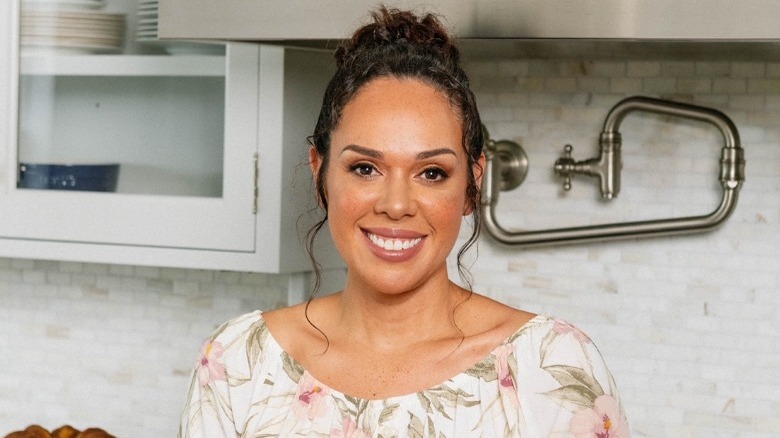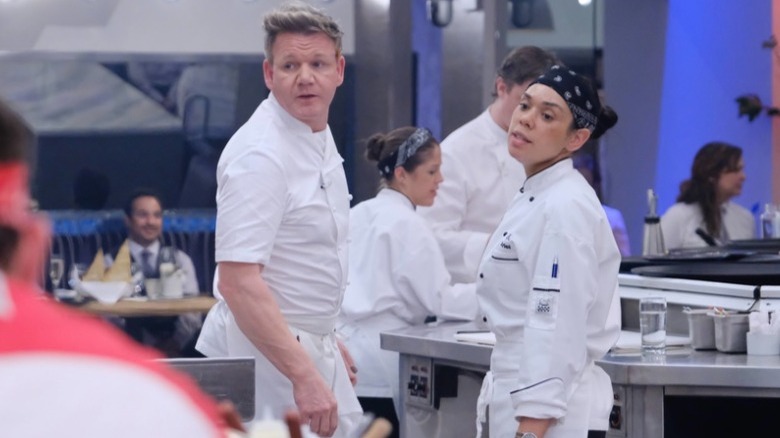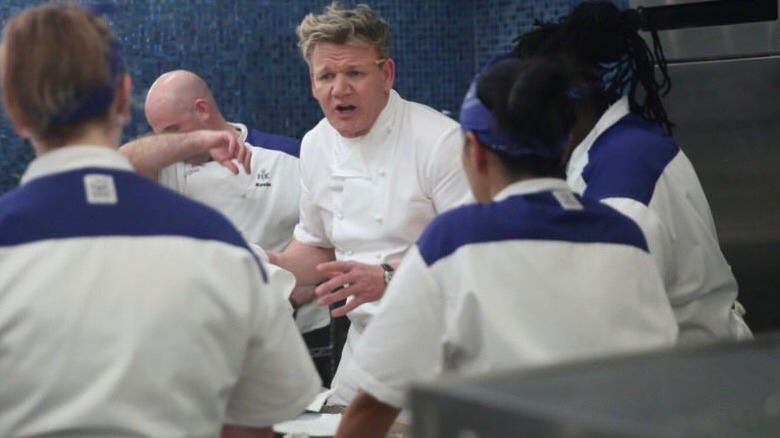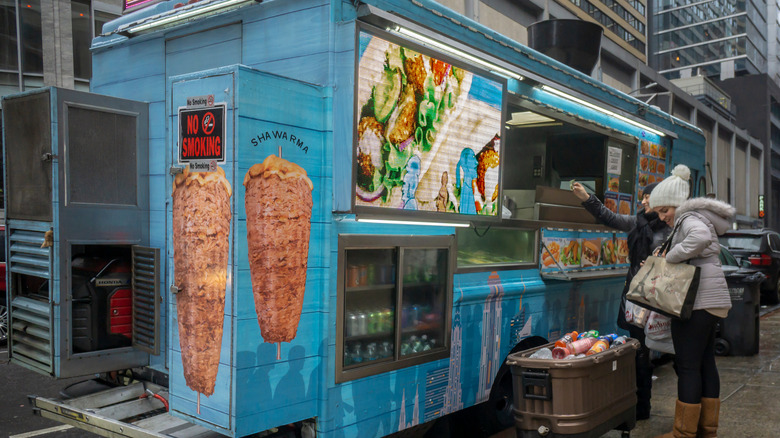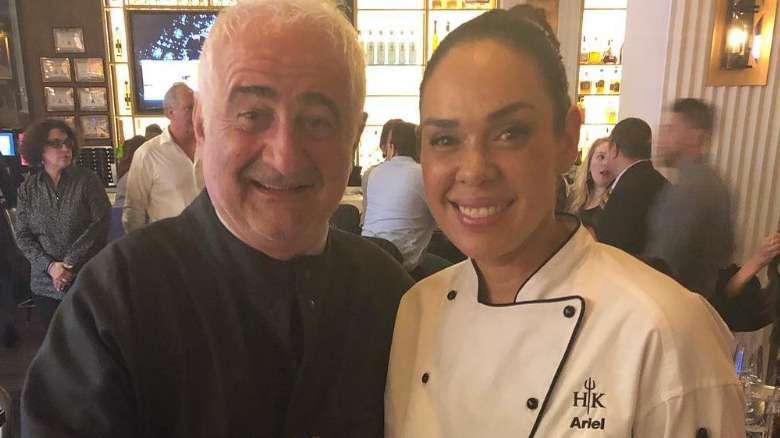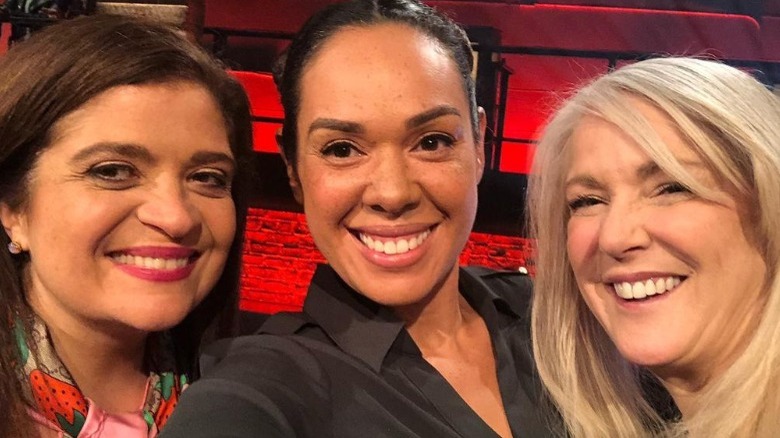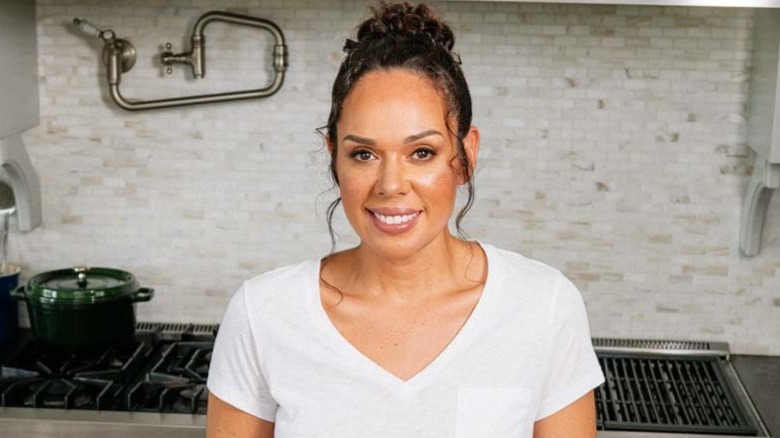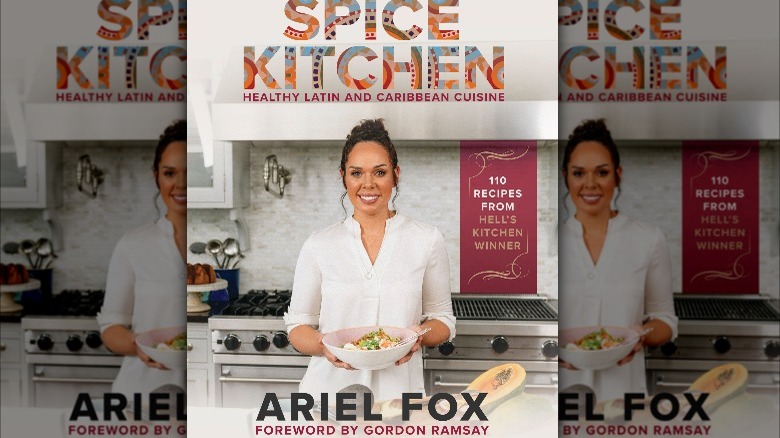Hell's Kitchen Winner Ariel Fox Talks Judging Competitions, Her New Book, And More - Exclusive Interview
You've likely seen Ariel Fox lately as a guest judge on "Beat Bobby Flay." The "Hell's Kitchen" champion was ready for it — describing the transition from contestant to judge as "actually a moment" as a woman. But finding the confidence to step into the expert role was a long time coming.
Ariel Fox didn't come up in a culinary industry that was always supportive of females; quite the opposite. If that's changed, it's in no large part because brilliantly talented women like Fox are claiming the spaces in the culinary world that they deserve. We sat down to meet the chef who is okay with failing "on a weekly basis" (most recently with bone marrow), because not playing it safe is how you win competitions like "Hell's Kitchen."
We'll let her tell you why she turned down Gordon Ramsay's job offer — but don't make the mistake of thinking she took a demotion. Fox is currently thriving as Concept Executive Chef of Dos Caminos, a Mexican restaurant with four locations in New York City. If you haven't sampled her food there, you can taste what she has to bring to the table in August when "Spice Kitchen: Healthy Latin and Caribbean Cuisine," hits the shelves. In the meantime, Fox shared her culinary journey and tricks of the trade in this exclusive interview.
Ariel Fox's favorite recipe
Which recipe in your cookbook do you make the most?
Probably a lot of the breakfast. The breakfast piece is a big part because that's a meal that I really enjoy. I enjoy it more on the weekends. I wouldn't say that I have a ton of time to eat breakfast during the week; the kids are going off to school. But probably the morning stuff.
As far as a big recipe for me, the pozole is one of my favorites. People come over to my house when they hear I'm making my pozole, and we have pozole parties. That's a fun one for our household.
What's special about it for you?
I like it because it's not a plated meal. It's such a gathering meal. I make it in this massive pot — I now actually started making it on the grill in this big, hot pot. You have this time to chat, while it's cooking around the grill, outside. Then you can either set it up outside, or you can move everyone inside.
I love how it becomes this spread. You've got all these toppings, shredded vegetables — you can pretty much put anything you want on it. I love the messiness of it. Everyone grabs a bowl and starts throwing stuff in there, and I like the family-style of it.
Ariel Fox shares the secret to griddle cakes
Take us back all the way to when you were selling vegetables off a farm at markets. You sold vegetables to Alice Waters, and that experience inspired a lot of the philosophy of using fresh and seasonal foods that's behind your cookbook today.
Absolutely. I'm from California. Being from California, I grew up a little bit more in tune with nature and the environment. It comes with the territory of the California vibe and upbringing. Specifically, where I grew up in Santa Cruz is super ... "granola," you might call it. Anyone who knows the college there, [the mascot is] the Banana Slugs. Everything's very much about doing what's right for the environment, doing what's right for everything, mind, body, and soul. I was definitely in tune as a young person. But in high school, you don't really get the things that shape you when you're that young because you're so distracted.
Working on the farm, it was an incredible experience. I wish I could transport back [there] and appreciate it more and pay more attention to all of the nuances of it. But I definitely enjoyed it. The biggest inspiration was being able to drive up to San Francisco to go to the huge farmer's market on the Embarcadero. There were so many chefs. I didn't even realize at the time that I was being introduced to this world that would definitely later ... The seed was being planted, no pun intended. That really did shape my decision later to go to culinary school.
You also write in your new cookbook that you spent time slinging griddle cakes in a pop-up stand at Williamsburg on weekends. What's the secret to a good griddlecake?
Anything that's like French toast, any kind of custard-baked bread — it's all about the staleness of the bread. I never make anything like that with a fresh bread, because it doesn't have that same fluffy body when it soaks up all that custard and cooks. That griddle cake recipe is not in this book because this is my healthy book — maybe in the next one, when I do my non-healthy versions.
But that griddle cake, I perfected over many years. [It's] a lot of clarified butter in the cooking process added as you're cooking. It's crisping on the outside and growing on the inside because of the custard, and there's an ungodly amount of clarified butter when you cook a good griddlecake.
Ariel Fox explains the real difference between table salt and finishing salt
You have an entire section of your book dedicated to sourcing the right ingredients. What's one ingredient that you couldn't live without?
I only get one? Oh, my goodness. It's such a toss-up, but a good flaky sea salt is paramount for me. I can take anything — whether it's half of an avocado, a slice of Sashimi, anything — I can eat anything with a little bit of flake salt on it and be happy.
You'd be surprised how many people talk about the importance of a good salt. It must be the most underestimated ingredient. What is the difference between a basic salt and a really good salt for you?
Do you know what's funny? You go in this chef-y space sometimes when you're coming up through this business, and you get a little, "I only use the best salt." I've actually found [that] there is a place for every type of salt. Oddly enough, I was just doing a tasting yesterday, and we were making potato chips. [The] potato chips come out of the fryer, fresh-cut potato chips, [and] it's almost impossible to get salt to stick to them. Anyone who eats McDonald's french fries, which I don't eat on a regular basis ... A good french fry from a fast food place, the reason why they taste so good is because they're tossed with iodized salt. There's a time and a place for that — it works.
We tried everything. We were trying fleur de sel, we're trying flake salt, we're trying Baleine, all these things. I was like, "I can't get this seasoning right on these potato chips." Then it clicked. I was like, "Wait a minute. I'm not thinking about this right. When you go buy a bag of potato chips, the reason why they taste so good is because they're seizing with that type of salt."
We figured that [out], and then it worked. But as far as fresh cooking, like what we're talking about, kosher salt has its place in the layering of cooking. It's a good base seasoning for batch recipes and whatnot. For me, finishing salt is everything, because that's where you tie it all together at the end. It matters if you have a good fleur de sel or Mediterranean sea salt. There's different salinity to it. I have probably about six on my counter at any given time.
Ariel Fox's advice to young women in the industry
You once said you spent the first decade of your career in not very rewarding positions in the industry doing salad prep, etc., in no small part thanks to sexism. What got you through that? What would you tell a young woman in a similar position today?
I did come up when there was a lot of — I never personally compromised myself in any physical way. But we all, in my generation, compromised in some way, whether we allowed inappropriate remarks in the walk-in refrigerator throughout the day ... I put up with more than I should have. Anyone starting out in this business today, the most important thing to say to a young woman ... It's a different space. There's definitely a lot more spotlight, so there's a little bit less of that going on. But it's not gone, and it's going to be there, and it's going to stay there.
It's important to tell a young woman that it's okay to say, "No," and to say, "That bothers me," or whatever you need to say and not to be afraid for your job. We've gotten to a place now where there's a little bit more support. I hope that people don't have to put up with as much as we put up with, because it was wild, looking back on it. The things that would happen in the kitchens, and the things that people would say, and you would laugh and giggle because you wanted to fit in and be part of the cool restaurant crew. You might have been tired, but you still went out after work, even though you knew you shouldn't go out, because that's what everyone was doing.
I would tell people [that] if you truly are passionate about this and this is truly what you want to do, you don't need to hang out and party with people. Focus on you. Do you.
How to pick out a Hell's Kitchen champion
After winning "Hell's Kitchen," you did not take a position in Gordon Ramsay's restaurant. Why?
We did film fairly long before it aired. It had been two years. When I filmed, I had every intention of winning and taking that job. Where I was working at the time that project was done, I was ready to move on. In my personal life, [I] was between relationships, between jobs. Then, by the time it aired, I had started a new job. I had moved. I met my now-husband, and I had a baby.
I respectfully had to say, "I don't think I want to pick up and raise my child in Las Vegas right now." I had a position with a good new company, and I was doing well, and working my way up the ladder. They understood. Gordon and his team — what do you say to that? Life happens, right? We are on good terms.
You watch new seasons of "Hell's Kitchen" as they come out. How do you separate front-runners from those who probably aren't going to make it?
I have a method. [It's] 60% about the person — the way they carry themselves and how they're moving in the kitchen and how they work. [They exhibit] a level of leadership without needing to assert leadership. Everybody gets nervous, but you can tell [when someone has] a little bit of confidence.
40% of it is also how entertaining people are, because it is television. The front runners are also big personalities. You have to have both. In this business, it's full of personalities. That plays [a part] as well. It's confidence, motion, the overall vibe. I'm usually pretty spot on, but sometimes I totally guess wrong.
Why Hell's Kitchen's first dinner service is so scary
What is the first dinner service like on the show?
It is so scary. It was just as scary the second time. I was definitely more calm and collected, but you get this binder and you've got 24 hours to memorize these prep recipes and line recipes. Everyone's figuring each other out, and you're not used to working in this kitchen, and it's so hot. Those French flat tops are so hot. It's very hard to get used to. [To] anyone who hasn't worked with a French flat top, it's like heat in your face. [There are] new knives that you might not be used to. Everything feels off.
Then, you get this food show where the sous chefs rapid-fire every dish from the menu. That's it, that's your lesson. Take notes, do what you've got to do, but here it is. And then it's the station assignments that really freaks you out, or [it] freaks me out. It's not knowing where you're working for the night. Mentally, you saw all these plates, but you don't get to find out if you're going to be doing the appetizers or the fish or the steak. It's that uncertainty, and it changes every night. You master [a] station and then ...
Then you're moving on to something else.
Yeah. Your other station.
You've said several times that your experience on the show taught you not to play it safe, and the [non-safe] zone [is] where you thrive. What is the last dish that has tripped you up, or that you failed at because you were not playing it safe?
It happens to me on a weekly basis. You have to be okay to fail. I'm in the middle of a few menu changes right now, and I just had to present a whole menu. I presented what worked and what I felt strongly about, and they all got approved, which is great. But in that process, there [were] some absolute duds that, when that happens, I have a really bad day. I take a hit and it bums me out, and then I've got to start over.
The most recent one was [where] I was trying to do this stuffed bone marrow thing. TikTok made me do it because I saw someone do it on TikTok, a similar thing. I was like, "Oh, I'm going to do my version of it." It was an epic failure. I probably presented nine bone marrows to my husband, and every time, he was like, "This sucks. It's not working." I kept getting deflated, and I finally was like, "You know what? Can't do it. It's not working. Move on. It happens."
Ariel Fox's favorite New York street foods
You moved across the country from Northern California to New York. What's one thing that surprised you about the New York East Coast food scene? Is there anything that you miss about California's food scene?
When I first moved here, the lack of Mexican food was a little bit of a shock for me. In California, there was a lot of Mexican and a lot of Salvadoran [food]. When I came here, it was a total shift, in the Latin space anyway, [in] that it was Puerto Rican and Ecuadorian [foods in New York]. That was very different for me. At the time, I hadn't dove into Puerto Rican food that much. I'm much more familiar with it now, and it's part of my life with my extended family. But what I miss the most is that typical California cuisine.
You have this new — I guess "new-American" [cuisine] would be the term now [in New York], but I miss that California cuisine, Zuni and Suzanne Goin's restaurant [in particular]. It's so simple and yummy on the plate. There's definitely a lot more fine dining and fancy stuff over here on the East Coast. I miss those little cafés — oh, the coffee shops. I'm going to have to back up. I miss the coffee shops — the cool [vibe], there are books and these funky couches, and someone's playing music. You go and you work there, and you drink coffee for hours and hours and hours. They don't have that over here.
You've also said that one of your big weaknesses is street corn. When in New York, what are your favorite street foods?
When I will indulge in street food, anytime someone has empanadas or arepas, I will definitely get down with those. In the beginning, when I moved here, I used to love getting — we didn't have shawarma trucks in California. When you get introduced to that three o'clock in the morning shawarma ... That's something else. That's some really good stuff.
What else? There's a lot of good street food. The food truck scene has absolutely blown up. [There's] Smorgasburg and all of these things — it's basically street food, and it's insane. I'm looking forward to the summer again. It's been two years since you got to experience Smorgasburg and all the street food festivals.
Meeting culinary legends
Since gaining notoriety through your work and through "Hell's Kitchen," you've met a lot of legends in the industry. I saw on your Instagram that you met Martha Stewart and Guy Savoy. What was that like, and who have you been most starstruck by?
It was cool because I had initially met Guy Savoy through Gordon Ramsay at an opening party for the Hell's Kitchen restaurant in Las Vegas. I think that was the first time. He was so humble and amazing and friendly. Fast forward two years later, I was in Paris, and I made a reservation. I wanted to go to his restaurant. He was actually there, cooking — I don't know why that surprised me. He's actually the chef in his restaurant. I know that sounds ridiculous, but you'd be surprised how many [don't cook in their restaurants]. When you get a big name [and] you've got a lot of businesses to run, you're not necessarily running a shift.
But he came out and remembered me, and he gave us the most amazing dining experience. It's got to be one of the top five of my whole life. That was really cool. I was like, "I can't believe this guy remembers meeting me and treated me like this." It's great.
Judging on the Food Network, I get to meet a lot of people. Iron Chef Alex [Guarnaschelli] is one of my favorites. She's so down to earth. She's amazing. I got to give her a preview of the book, and she really liked it. It was cool to be able to have people read your stuff. Martha Stewart's the queen. I adore her to this day. She's amazing. There's so many. It's a great family.
If you could have any chef cook for you, who would that be?
Oh my gosh. I got to work with Matt [Orlando], which is René's [Redzepi] old partner in Noma. I never got to eat René's food. I'd love to have a really cool [meal from] when he did his pop-up in Tulum, which is near and dear to my heart. I would love to have him do some kind of Latin-Scandinavian infusion dinner for me. That would be awesome because there's so many elements of that that would work well together. I heard amazing things about that pop-up. I'd be pleased if he cooked a dinner party for me.
What Alex Guarnaschelli is really like according to Ariel Fox
Let's go back to your experience judging on Food Network. Tell us about the transition from contestant to judge.
I love competing. It's great. I still get nervous when I do, and I think that it's good for the soul. I like that I've entered the judging space because I do feel that I have something to bring to the table. At this point, the amount of experience with so many different cuisines, and so many different people, and different levels from fast-casual, to quick service, to fine dining ... At one point, someone I was working with was like, "There's a point where you have to claim your space as a tastemaker and that you are an expert in your craft."
But that's not just good on paper. It's actually a moment for you as a woman. A lot of times, like any other woman, you have imposter syndrome or you feel like you are not performing. You have to one day be confident, just like all of your peers, and say, "You know what? I know what I'm doing. I know what I'm talking about. I have a right to be in this space too." It was important for me mentally and emotionally to start doing that.
But I don't think I'm done with competing. I like them both. It's good for you to keep challenging yourself.
Can you share your favorite behind-the-scenes experience with Alex Guarnaschelli, as you said you really enjoy her company?
I love her as a mom. No matter what she's doing or how much she's grown ... I'm so happy for her with her new show, but behind the scenes, she's a cool woman, and she's always an amazing mom. When you get to see that side of her, or if you follow her on Instagram, that's real. That's real life and real love. I love the fact that no matter what she does, she's just her, and she's a mom.
On being a mother in the culinary world
You're also a mom. Being a mother in this industry must have its unique challenges.
It does. Most of my colleagues at my level in the company, they've got their wives or partners who are the moms or the caretakers. It's often difficult to be in a room with all the people who [aren't] worried about what's going on at home. They've got someone else worrying about that.
So I do find it challenging to be confident when I need to check my phone. I'm not doing something wrong; I have two roles, and that's okay. I have to be able to do both. It took me a long time. This pandemic, if any silver lining came out of it, would be employers and companies being more cognizant of that multiplicity and how you have to be able to wear many hats, and that the work week isn't what it used to be.
In my position, I work seven days a week. It's not that I'm being overworked, I just work seven days a week, because I don't have a shift from 9 to 5, or a chef shift from 10 to 10 at night. My role is all the time, but I'm also a mom all the time. That is very challenging because your family doesn't always understand that when you're on your phone, you're working. "Mommy, mommy, when are you going to be done?" "Well, I'm never really done."
It's tough, but you've got to find your cadence. The most important thing is to be confident and own the fact that you are both. Don't try to pretend that you're not. Yes, I'm in this meeting with these COOs and [saying], "I'm sorry. I need to step away. My kid just fell off the caterpillar and I need to take this phone call." That's okay, and I'll be right back.
Ariel Fox's new cookbook is a celebration
We're about to see your new cookbook hit lots of bookshelves in kitchens, hopefully. How do you want people to use it and to receive it? What's your hope from this book?
I want people to see this book not just as, "Oh, I can only use this if I eat grass-fed butter only, and use almond flour only." I don't want people to see this book as, "I can only use this if I'm on some crazy alternative diet."
[With] every recipe — these recipes I've been doing my whole life from my heritage — I've given some healthier options on how to still enjoy them and still feel good and clean and healthy. I want people to understand this is a celebration of ethnicity, and heritage, and women [throughout] generations. This is my mom, this is my grandmother, this is my great-grandmother.
In a place where we're all obsessed in some way — maybe some of us say we're not, but we are all somewhat on some level concerned with our image and how people perceive us ... In the wellness space, a lot of times, we lose ourselves. We lose our personality and background because it just becomes [about] image. This book is a celebration of both. You can feel fabulous. You can feel beautiful. You can feel healthy, and vibrant, and alive, but you can also embrace who you are [and] where you come from.
I want this to also be for the next generation. For all those healthy moms out there right now who have any background, I want you to have options to show your daughters that we can still eat the foods of our mothers and grandmothers and feel good about ourselves and our bodies. So I call it a celebration.
Ariel Fox's new book, "Spice Kitchen: Healthy Latin and Caribbean Cuisine" is available for preorder now and will be available wherever books are sold on August 23.
This interview was edited for clarity.

